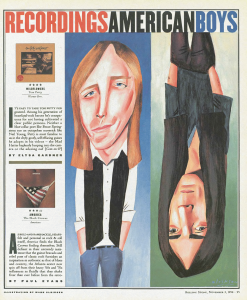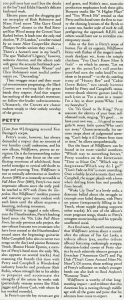Recordings: American Boys
Review by Elysa Gardner
Rolling Stone #694 - November 3, 1994
Wildflowers | Tom Petty | Warner Bros | ★★★★
It's easy to take Tom Petty for granted. Among his generation of heartland-rock heroes he's conspicuous for not having cultivated a clear public persona. Neither a blue-collar poet by Bruce Springsteen nor an outspoken maverick like Neil Young, Petty is most familiar to us in the dryly goofy, self-effacing guises he adopts in his video -- the Mad Hatter haplessly burping into the camera or the adoring oaf dragging around Kim Basinger's corpse.
Petty's music, however, has always demanded a respect that no amount of wry humility could undermine, and his new album, Wildflowers, proves no exception. On it the fortysomething rocker offers 15 songs that focus on the conflicting emotions of adulthood, from rueful nostalgia to cynical self-doubt to hope and yearning. True, Wildflowers is not as sonically adventurous as Southern Accents (1985) or as instantly accessible as Full Moon Fever (1989), Petty's two most impressive albums since the early peak he reached in 1979 with Damn the Torpedoes. But Wildflowers' resolute passion and maturity grow more evident with each listen until the album acquires a haunting, enduring resonance.
Wildflowers is tagged a solo effort, sans the Heartbreakers, Petty's backing band since the '70s. Like Full Moon Fever, his only previous solo project, the new release features two musicians who have been central to the Heartbreakers' sound since the beginning: guitarist Mike Campbell (who also co-wrote two songs on the disc) and pianist Benmont Tench. (Bassist Howie Epstein, a member of Petty's band since the early '80s, also appears on several tracks.) And manning the boards this time with Petty and Campbell is Wunderkind industry honcho and producer Rick Rubin, whose strength lies in his ability to pinpoint and accentuate the strengths of the artists he works with (particularly veteran artists like Mick Jagger and Johnny Cash, with whom he has worked recently).
In Petty's case the key virtues are grit and grace, and Rubin's taut, muscular production emphasizes both these gifts. Buoyant tracks like "A Higher Place" and "You Wreck Me" remind us that Petty and his band were the first to marry the chiming lyricism of the Byrds to a more raw, harder style of rock & roll, prefiguring the approach R.E.M. and others would later use to revitalize contemporary music.
Also at the fore is Petty's sense of humor. For all its urgency, Wildflowers brims with flashes of the singer's trademark deadpan wit, from the crisply rhythmic "You Don't Know How It Feels" -- on which he asserts, "Let me get to the point/Let's roll another joint/And turn the radio loud/I'm too alone to be proud" -- to the sly, snarling irony of "Honey Bee" and "Cabin Down Below," two steady burners fueled by Petty and Campbell's testosterone-drunk electric guitars (and by such lyrics as "I'm a man in a trance/I'm a boy in short pants/When I see my honeybee").
On "It's Good to Be King," Petty assumes the identity of your basic self-obsessed male, singing "It's good...to have your own way...It's good to meet girls/A sweet little queen/Who can't run away." Characteristically, his sarcasm stops short of judgmental sneering. "Can't help it if I dream from time to time," he allows sympathetically.
But the heart of Wildflowers can be found in its more wistful numbers. "Which way to something better," Petty wonders on the bittersweet "Time to Move On." "Which way to forgiveness/Which way do I go?" "Don't Fade On Me" is more unsettling: Over a darkly lyrical acoustic duet with Campbell, the singer pleads with a lover who's drifting from him and possibly from herself.
"Wake Up Time" is a lovely coda, a dramatic ballad about the struggle to triumph over failed dreams, with Petty on piano (temporarily filling in for Tench, whose supple playing supports other tracks). It's one of the album's more poignant songs, thanks to Petty's stringent musicianship and his typically unaffected vocal.
As a final note, it's worth mentioning that Wildflowers arrives about a month after the release of You Got Lucky, a tribute album (yes, another tribute album) featuring endearingly scrappy, distortion-fueled covers of Petty classics by such relatively obscure groups as Everclear ("American Girl") and Fig Dish ("Don't Come Around Here No More"). Of course, those seeking proof of Petty's influence on today's younger bands can also look to Soul Asylum's "Runaway Train."
Wildflowers is worthy of that long-standing impact -- and evidence that this American boy is moving through middle age with all the gusto and poise that his admirers have come to expect.



